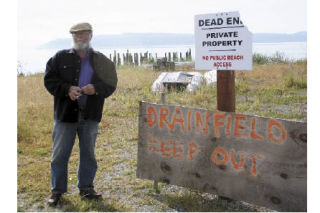Resident wants to preserve public access
Public beach access, or lack thereof, on Whidbey Island is a touchy subject for many longtime residents.
Greenbank resident Glen Russell has been using a small beach at the end of Wonn Road, near the Greenbank Farm, for the last 35 years. Now access is in jeopardy as residents who own the surrounding property plan on putting up a stone wall to prevent people from getting to the shoreline.
Russell is on a mission to keep his favorite beach open to him, his grandchildren and the community at large.
“They don’t want riff-raff on the beach,” he said. “The problem is, the riff-raff were there before they were.”
On the other hand, Bruce and Joann Montgomery are certain that they own the beach property. They want a wall for privacy and protection. Bruce Montgomery said records reveal that the beach was never in public ownership and he emphasizes that he pays property taxes on it. The misconception over the ownership was fueled, he said, by a WSU Extension map of the island which incorrectly shows his property as a public park.
“People drive in and have a picnic in my front yard,” he said. “They drive over my septic system, which is a good way to ruin it.”
Assistant County Engineer Randy Brackett said ownership of the beach and adjacent tidelands is an open question. He said county records appear to show that the county owns the area, but the county prosecuting attorney’s office is reviewing the documents.
Brackett said county officials elected to give the Montgomerys a permit to build the wall, because the evidence of public ownership is fuzzy. He said they will build it at the risk of having to take it down.
The beach in question is at the end of an extension of Wonn Road. It appears to be a driveway on North Bluff Road. Brackett said it’s undisputed that the county owns the right-of-way for the road down to the beach, but the question is whether the beach and tidelands at the end of the road are in public ownership.
To Russell, the answer is obvious.
“Otherwise, it would be a road to nowhere,” he said. “To think this could be ripped off from the public has incensed me.”
Both Montgomery and Russell claim to have research on their side.
Wonn Road used to be called Greenbank Road when it was the only road in the area. It led to a dock located at the disputed site, though now only pilings remain. On the site of the current Greenbank Farm, there was once a resort hotel, a post office and a general store that was later moved and became the famous Greenbank Store.
Montgomery said the beach was specifically excluded from public ownership at the time of the 1944 Greenbank beach plat. He said the residents in the immediate vicinity owned and used the beach.
“Everybody always thought it was a public easement when actually it belonged to the people who lived there,” he said.
Now, he claims to have clear ownership.
Russell, however, said Island County files list the area in the inventory of public beach access. Also, he said the files document a history of public complaints against the owners of the lot south of Greenbank Road for attempting to deny people access. In the end, the community continued to use the access point.
Russell claims that the beach has been in constant public use since the first settlement in Greenbank.
It’s especially important to keep it open, he argues, since there’s limited public access to the water in the county, particularly from Freeland to Coupeville. He said the site in Greenbank is a perfect spot to put in a kayak. There are several parks on Camano Island within paddling distance, including the new Cama Beach State Park, which opens today.
Montgomery describes the contested beach as a tiny area of “barnacle-covered rocks” that’s not worthy of a public outcry. People who launch boats in the area, he said, are actually trespassing on his undisputed private property.
“As soon as we decided to build the wall, citizens started coming out of the woodwork, saying that it’s a crime against humanity,” he said.
Montgomery hopes that the matter doesn’t end up in court, as the cost of litigation would greatly exceed the value of the property.
Brackett agreed that preserving beach access is a public priority. If if were up to the public works department, he said officials would likely recommend fighting to keep the area public.
But like many real estate disputes, it may end up in the hands of lawyers.



